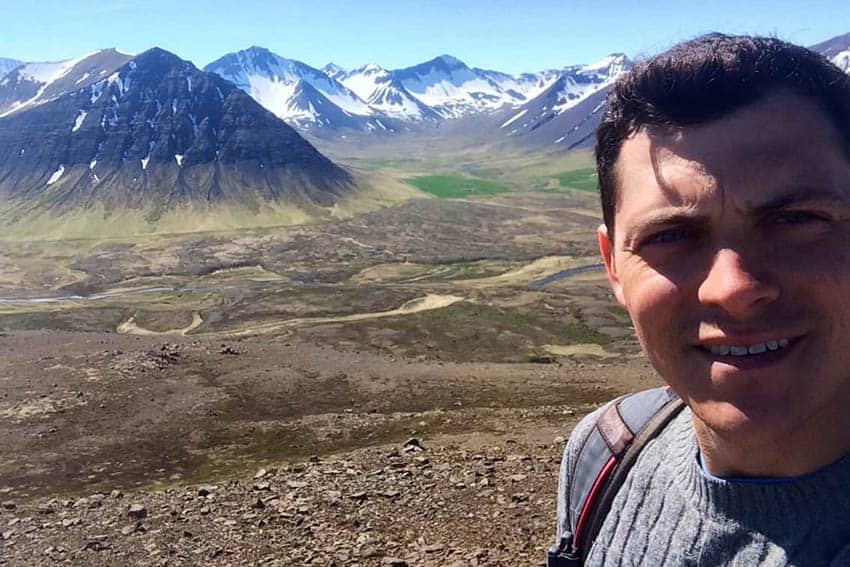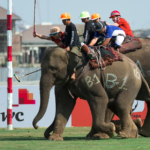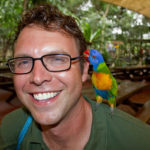Matt Kepnes runs the award-winning travel site nomadicmatt.com, which helps people travel the world on a budget. He’s the author of the NYT bestseller How to Travel the World on $50 a Day and the travel memoir Ten Years a Nomad. His writings and advice have been featured in the New York Times, The Guardian, Budget Travel, Time, Washington Post, Wall Street Journal, CNN, BBC, and countless other publications. When he’s not on the road, he lives in Austin, Texas.
How did you get started traveling?
I didn’t take my first trip abroad until I was in my twenties. At the time, I was working a boring office job and needed to use up my vacation time, so I booked a trip to Costa Rica. That trip opened up my eyes to the world of travel, and left me wanting more.
After that, I went traveling to Thailand with a friend, and it was there that I met some long-term backpackers. That changed everything.
Up until that time, “travel” was just what you did to use up your vacation. Those backpackers showed me that there was a whole wide world out there that I could explore on my own terms. I just had to take that first step.
So, after that, I came home, quit my job, and prepared for a trip around the world, like they were doing.
For the next year, I worked as much as I could and saved every penny. I sold my stuff and eventually embarked on a yearlong trip that actually lasted over 18 months. After that, I was hooked on the backpacker life.
How did you get started writing?
When I first started traveling, I didn’t have a lot of money. I was a frugal backpacker and needed to pinch pennies to make ends meet. That led me to teaching English in Thailand and Taiwan. However, I realized I’d need to make more money if I wanted to travel indefinitely.
My initial dream was to be a travel writer for guides like Lonely Planet. I wanted to be a mix between Bill Bryson and Anthony Bourdain. So I started a website to document my travels and get my writing out there, but it ended up attracting its own audience, so I eventually decided that I could skip writing for other people and make money writing for myself.
While my first blog was hardly professional (the website was ugly and my writing was terrible), it got my foot in the door and led to me writing for all kinds of publications, which helped establish my website as the go-to resource for budget travel.
One thing just lead to another and here I am!
What do you consider your first “break” as a writer?
In November 2009, I saw a tweet from the New York Times’s Frugal Traveler, Matt Gross. He was looking for someone with experience making money from a travel blog. I tweeted back, basically yelling, “Pick me, pick me, pick me!”
And he did.
That article by the Frugal Traveler put me on the map. (In fact, it sent so much traffic to my site that my server couldn’t handle it and the site shut down!)
Another big writing break came when I published my book How to Travel the World on $50 a Day. I spent months on a road trip around the US promoting the book (all while traveling on $50 a day to prove that my concept was valid), and it became a NYT best seller, which opened a lot of doors and helped me attract new readers to my site, taking my blog and business to the next level in the process.
As a traveler and fact/story gatherer, what is your biggest challenge on the road?
I think the biggest struggle is finding a work/life balance. It’s far too easy to spend too much time working online. You’re always just an app or an email away from work, which can really impede your travels and make your trips less enjoyable.
To help stay focused, I generally try not to work when I travel. I’ll jot down notes for things I want to write about, but I’ll focus my time on the trip itself, so that I can really immerse myself in it. Then, when I get home, I’ll have a deeper and more nuanced experience I can write about. I find that leads to the best stories and content, because I’ve allowed myself the time and space to have experiences without thinking about what they will translate to on the page.
What is your biggest challenge in the research and writing process?
I think one of the most difficult things is finding the time to write consistently. Since I manage a team and run a business, there are a lot of moving parts, so I’m constantly pulled in different directions. If I want to write, I really need to be proactive and build time into my daily schedule. Between work distractions and regular internet distractions, it’s far too easy to get behind on writing (I’m still “starting” my third book).
To combat this, I’ve learned to embed time into my schedule each day so I can get some writing done. I’ll literally pencil in a block into my calendar so I know it’s time to write, which gives me permission to ignore messages and emails and lets me focus on my craft.
What is your biggest challenge from a business standpoint?
COVID. While we’ve made it through the other end in one piece, it definitely took a toll on the business and forced us to change tack, simplify the business, and re-evaluate how we do things.
Beyond that, it’s surprisingly difficult to find good help. I have a great team behind me now, but when it comes to finding freelancers to help with writing or research, we’re always struggling. We cycle through a lot of people to find the perfect person. But luckily, when we do, they stay a long time so we have a nice tight-knit group.
Have you ever done other work to make ends meet?
When I first started blogging, it was common to sell links as a way to make money. It was the Wild West of Google, so you could easily sell links if you had a decent website. Companies would pay good money to get a backlink from a high-ranking website, so that’s how I made money at the start (I was also teaching English at that time).
Once my blog started growing, I eventually had to branch out my content in order to grow my audience — and to grow my revenue. While sharing funny stories and my thoughts on the nature of travel are interesting topics to some, they aren’t really ones that bring in revenue.
So, I had to dive into the world of affiliate marketing to diversify my revenue streams. That meant writing about boring topics like travel insurance, which, while important to travelers, aren’t super fun to write. But that’s now part and parcel of being a blogger and travel writer. You need to write those service pieces to pay the bills, so you have the freedom to write the articles you want without worrying if they will make any money or not.
What travel authors or books might you recommend and/or have influenced you?
When it comes to the best travel books, I think Vagabonding should be mandatory high school reading — and I’m not just saying that because I’m being interviewed for this website. That book really inspired me when I was planning my trip.
I didn’t know about long-term travel until I was in my twenties, so I think it’s something kids should be made aware of sooner, so they know that travel is a viable option — both as a career and also just as a method of personal development.
Other books I consider mandatory reading for would-be travelers are The Alchemist, The Beach, On the Road, and pretty much anything by Bill Bryson or Anthony Bourdain.
What advice and/or warnings would you give to someone who is considering going into travel writing?
Two things: Writing is a skill, and perfection is the enemy of the good enough.
My first blog posts and articles were terrible, because I was fumbling my way through the process. Eventually, I invested in editors and books about writing and courses. I spent time learning how to be a better writer, because it’s a skill you need to hone. Just because you can write doesn’t make you a writer — so invest in yourself. A lot of people, especially online creators, don’t take the time to hire an editor or take a writing class. They should. No one gets ahead without someone better saying, “No, do it this way.”
Second, don’t wait until your writing is perfect. It will never be. You’ll read your old stuff years later and cringe. Why? Because you will have grown as a writer. It’s the nature of the beast. It’s why writers, like actors, don’t often go back and read their old work. They always want to make changes. Just put it out there in the world. It may not win a Pulitzer, but you don’t get better until you hit “publish.”
What is the biggest reward of living the life of a travel writer?
The freedom. As a travel writer, you can pretty much pack up and go anywhere and write about anything. The only limits are your creativity. While this can be daunting at times, it’s also incredibly liberating. There are all kinds of stories out there. All you have to do is step out the door and look for them.





